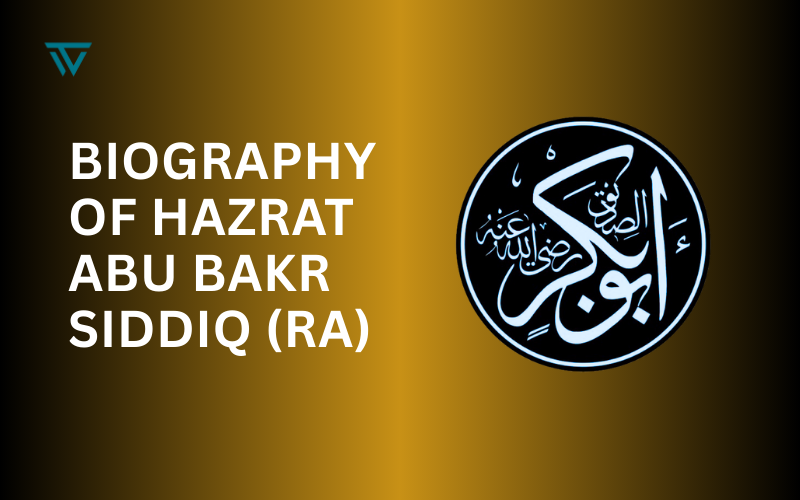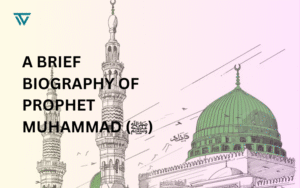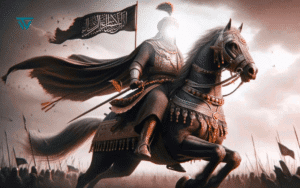Hazrat Abu Bakr Siddiq (RA) the first Caliph of Islam

0 people are currently reading this article
Hazrat Abu Bakr Siddiq (R.A) is a name Muslims utter with deep reverence. He stands as a monumental figure in Islamic history. His unwavering faith, profound wisdom, and steadfast leadership during a critical time cemented the Muslim ummah (community). This biography explores the life of Islam’s first Caliph. He was a man whose legacy continues to inspire millions globally. His story shows immediate belief, selfless sacrifice, and dedicated service to Islam and its Prophet, Muhammad (Peace Be Upon Him – PBUH).
Hazrat Abu Bakr Siddiq (RA) Early Life in Mecca
Abdullah ibn Abi Quhafa, later known as Hazrat Abu Bakr Siddiq (R.A), was born in 573 CE in Mecca. He belonged to the respected Banu Taym clan of the Quraysh tribe. Abu Bakr (a nickname meaning ‘father of the camel’s calf’ due to his fondness for camels, though some say it was for his son Bakr) grew up in a prominent merchant family. Even before Islam, Meccan society recognized his upright character. They knew his honesty in trade and profound knowledge of Arab genealogies. He was a man of gentle disposition, known for kindness, empathy, and a keen intellect. This intellect distanced him from the common idolatrous practices.
His early work as a cloth merchant involved extensive travel. This broadened his understanding of people and commerce. These experiences sharpened his skills in diplomacy and judgment. Unlike many peers, Hazrat Abu Bakr Siddiq (R.A) reportedly never engaged in pre-Islamic Arabian vices. He maintained a dignified and respected position in Meccan society. This inherent purity of character would later make him open to Islam’s message.
The Dawn of Islam and the Title of ‘As-Siddiq’
The moment Prophet Muhammad (PBUH) shared his first revelation from Allah (God), Hazrat Abu Bakr Siddiq (R.A) accepted Islam without pause. This quick and firm belief marked him as the first adult male to embrace the new faith. His acceptance came not from emotion but from his deep knowledge of Prophet Muhammad’s (PBUH) perfect honesty. He knew his closest friend would not invent such a claim.
This absolute conviction earned him the famous title “As-Siddiq” (the Truthful). Prophet Muhammad (PBUH) recounted his miraculous Night Journey (Isra) and Ascension (Mi’raj). This was a journey from Mecca to Jerusalem, then to the heavens. Many in Mecca doubted. However, when skeptics asked Abu Bakr (R.A) if he also doubted, he famously stated that if the Prophet (PBUH) said it, it was true. This strong affirmation secured his status as a pillar of faith. After converting, Abu Bakr (R.A) tirelessly advocated for Islam. His influence led many other notable Meccans, like Uthman ibn Affan and Talha ibn Ubaydullah, to accept the faith.
Unwavering Support and the Migration (Hijrah)
Throughout Islam’s challenging early years in Mecca, Hazrat Abu Bakr Siddiq (R.A) remained a steadfast companion to Prophet Muhammad (PBUH). He endured persecution with other early Muslims. He used his significant wealth to free enslaved Muslims who faced torture for their faith. This included the notable Bilal ibn Rabah (R.A). His home often provided a safe place for early Muslims.
A key moment in their friendship and Islamic history was the Hijrah. This was the migration from Mecca to Medina in 622 CE. Prophet Muhammad (PBUH) faced intense hostility and death plots. He chose Abu Bakr (R.A) as his only companion for this dangerous journey. They hid in the Cave of Thawr for three days while Quraysh search parties looked for them. The Quran itself mentions this event. It highlights Abu Bakr’s (R.A) presence as the “second of the two” (Quran 9:40). This event showed the deep trust between them. In Medina, Prophet Muhammad (PBUH) married Abu Bakr’s (R.A) daughter, Aisha (R.A). This further strengthened their bond.
Hazrat Abu Bakr Siddiq (RA) Life in Medina: A Pillar of the New Community
In Medina, Hazrat Abu Bakr Siddiq (R.A) continued as an essential advisor to Prophet Muhammad (PBUH). He actively helped establish the new Muslim society and state. He participated in all major battles Muslims undertook to defend their community. These included the Battles of Badr, Uhud, and the Trench. The Prophet (PBUH) highly valued his counsel. People often entrusted him with important tasks.
His generosity remained well-known. On many occasions, he donated large parts of his wealth for Islam. Sometimes, he gave all he had, especially to equip armies and support the needy. His commitment was not just financial. It was a full dedication of his life and resources to Allah and His Messenger (PBUH). When the Prophet (PBUH) fell ill before passing, he asked Abu Bakr (R.A) to lead prayers. Many companions saw this as a sign of his fitness for future leadership.
The First Caliph: Steering the Ummah Through Crisis
Prophet Muhammad’s (PBUH) passing in 632 CE deeply grieved the Muslim community. It also brought uncertainty. This critical moment needed wise and decisive leadership. Amidst the sorrow, Hazrat Abu Bakr Siddiq (R.A) delivered a historic speech.
He quoted a verse from the Quran:
Surah Al-Imran, Verse 144
“مُحَمَّدٌۭ رَّسُولٌۭ قَدْ خَلَتْ مِن قَبْلِهِ ٱلرُّسُلُ ۚ أَفَإِن مَّاتَ أَوْ قُتِلَ ٱنقَلَبْتُمْ عَلَىٰٓ أَعْقَـٰبِكُمْ ۚ وَمَن يَنقَلِبْ عَلَىٰ عَقِبَيْهِ فَلَن يَضُرَّ ٱللَّهَ شَيْـًٔا ۗ وَسَيَجْزِى ٱللَّهُ ٱلشَّـٰكِرِينَ”
“Muhammad is no more than a messenger; messengers have passed away before him. If he died or was killed, will you then turn back on your heels?”
Abu Bakr (may Allah be pleased with him) said:
“Whoever worshipped Muhammad (peace be upon him), let him know that Muhammad has indeed passed away. But whoever worships Allah, let him know that Allah is Ever-Living and does not die.”
At a gathering in Saqifa Bani Sa’ida, deliberation occurred among the Muhajirun (Meccan emigrants) and Ansar (Medinan helpers). They then chose Abu Bakr (R.A) as the first Khalifa (Caliph). He was the successor to the Prophet (PBUH) in political and administrative leadership. His selection, confirmed by a pledge of allegiance (bay’ah), was vital for maintaining the Ummah’s unity.
The Ridda Wars: Uniting Arabia
Hazrat Abu Bakr Siddiq (R.A) caliphate lasted a little over two years (632-634 CE). However, it faced huge challenges. Widespread apostasy and rebellion across Arabia, known as the Ridda wars, posed the most immediate threat. Several tribes believed their Islamic allegiance was only to Prophet Muhammad (PBUH). They renounced Islam or refused to pay Zakat (obligatory charity). False prophets also emerged, further unsettling the region.
Abu Bakr (R.A) met these issues with remarkable courage.Showing unwavering resolve, Abu Bakr (R.A) famously declared his intent to fight those who separated prayer (Salat) from Zakat. To him, refusing Zakat was akin to rejecting a fundamental pillar of Islam and posed a serious threat to the socio-economic structure of the Muslim state. He organized and dispatched Muslim armies under capable commanders such as Khalid ibn al-Walid (R.A).
These armies quelled the rebellions. Despite early dangers, the Ridda wars ended successfully. This re-established the Islamic state’s authority throughout Arabia. It also consolidated Muslim unity.
The Compilation of the Quran
The initiation of the Quran’s official compilation was another major achievement during Abu Bakr’s (R.A) caliphate. Many Huffaz (Muslims who had memorized the Quran) died during the Battle of Yamama, a key Ridda war engagement. This alarmed Omar ibn Khattab (R.A). He feared parts of the Quran might be lost if this continued. He urged Abu Bakr (R.A) to formally compile the Quranic revelations. During the Prophet’s (PBUH) lifetime, scribes had written these on materials like palm leaves and stones. Companions had also memorized them.
Hazrat Abu Bakr Siddiq (R.A) was initially hesitant. He did not want to do something the Prophet (PBUH) had not explicitly ordered. However, he eventually saw the task’s necessity. He gave Zaid ibn Thabit (R.A), a chief scribe of the Prophet (PBUH), this vital responsibility. Zaid (R.A) carefully gathered all available written pieces. He cross-referenced them with other companions’ memorizations. This thorough effort created the first unified Mushaf (codex) of the Quran. Abu Bakr (R.A) kept this Mushaf. This act was crucial for preserving the Quran completely and authentically for all future generations.
Expansion and Administration
With internal stability restored, Hazrat Abu Bakr Siddiq (R.A) focused on external frontiers. He sent expeditions towards the Byzantine (Roman) Empire in Syria. He also targeted the Sasanian (Persian) Empire in Iraq. These actions continued initiatives Prophet Muhammad (PBUH) had begun. These early campaigns prepared the way for significant Islamic state expansions under his successors. Justice, consultation (Shura), and a deep sense of accountability before Allah marked his administration. He lived simply. He drew a modest stipend from the Bayt al-Mal (public treasury) only after companions persuaded him.
The character, virtues and last days of Hazrat Abu Bakr Siddiq (RA)
People renowned Hazrat Abu Bakr Siddiq (R.A) for his piety, humility, and wisdom. He showed a gentle nature. also deeply compassionate and often wept when reciting or hearing the Quran. His faith was profound and firm. He was known for his generosity. He freed slaves and gave immense wealth for Islam without seeking worldly praise. Despite his Caliph role, he remained accessible to common people. He diligently upheld justice.
In his first address as Caliph, he set a clear standard: “I have authority over you, but I am not the best of you. If I do well, help me; if I do wrong, set me right. Sincere obedience is to Allah and His Messenger. The weak among you shall be strong with me until I secure his rights, if Allah wills. The strong among you shall be weak with me until I take from him the rights of others, if Allah wills.”
After a brief illness, Hazrat Abu Bakr Siddiq (R.A) passed away on August 23, 634 CE (22 Jumada al-Thani, 13 AH). Before dying, he consulted senior companions. Then, he nominated Omar ibn Khattab (R.A) as his successor. This decision ensured a smooth leadership transition. It also brought further stability to the Muslim Ummah. People buried him next to Prophet Muhammad (PBUH) in Aisha’s (R.A) apartment, near Masjid an-Nabawi (the Prophet’s Mosque) in Medina.
To err is human. If this writing contains any mistakes, I humbly seek your gracious understanding and forgiveness. If you have any suggestions, you can contact. Or if you want to post your article. Write the article on Google Docs and share it with your name and email.
MD. Sujon Ahmed





